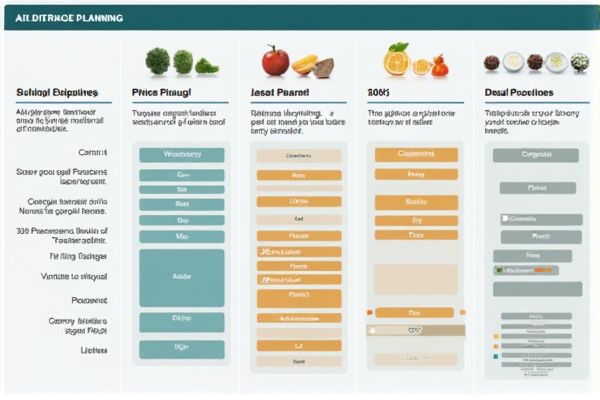
AI-driven dietary planning utilizes advanced algorithms to analyze individual dietary needs, preferences, and health goals. By inputting data such as age, weight, activity level, and specific nutritional requirements, users receive personalized meal recommendations that enhance overall well-being. Real-time monitoring allows AI systems to adjust plans based on progress, preferences, or emerging dietary trends. These intelligent systems can also suggest recipes, track nutritional intake, and help individuals make informed food choices that align with their health objectives.
AI usage in dietary planning
Personalized Nutrition Recommendations
AI can analyze individual dietary habits and health data to provide tailored nutrition recommendations. For example, a system like Nutrigenomix could suggest specific foods based on a person's genetic predispositions. This personalized approach may enhance compliance with dietary guidelines and improve health outcomes. The possibility of using AI in this way presents a significant advantage for those seeking to optimize their nutrition.
Real-time Caloric and Nutrient Tracking
AI can enhance dietary planning by providing personalized meal suggestions based on individual nutritional needs. Real-time caloric and nutrient tracking allows users to monitor their daily intake with greater accuracy. Tools like MyFitnessPal illustrate how AI can analyze dietary habits and suggest improvements. This technology offers the possibility of achieving better health outcomes through informed food choices.
Dietary Pattern Recognition
AI can analyze dietary patterns to personalize meal plans based on individual health needs and preferences. For instance, research from institutions like Stanford University shows that machine learning algorithms can identify correlations between food intake and health outcomes. This technology increases the likelihood of improved nutritional habits by suggesting tailored diets that promote wellness. Consumers may also benefit from enhanced understanding of their dietary choices and their long-term implications on health, allowing for better decision-making.
Customized Meal Plan Generation
AI can analyze individual dietary preferences and nutritional needs to generate customized meal plans that enhance health outcomes. For instance, a registered dietitian might utilize AI algorithms to create meal plans tailored to clients with specific conditions, such as diabetes. The technology offers the possibility of incorporating real-time adjustments based on users' feedback and progress. This personalized approach can improve adherence to dietary recommendations and increase the likelihood of achieving health goals.
Food Allergy and Sensitivity Alert
AI can analyze individual dietary preferences, health conditions, and allergies to create personalized meal plans. For instance, platforms like MyFitnessPal utilize AI algorithms to suggest food options that align with a user's dietary restrictions. This technology also alerts users to potential allergens in food products, reducing health risks associated with food sensitivities. The integration of AI in dietary planning thus offers the possibility of improved health outcomes and greater adherence to nutritional goals.
Virtual Dietitian Consultation
AI can enhance dietary planning by providing personalized meal suggestions based on individual health data and preferences. Virtual dietitian consultations enable users to access expert nutritional advice from the comfort of their homes. Through platforms like HealthifyMe, users can potentially improve their dietary habits with tailored guidance. The likelihood of better health outcomes increases as AI systems adapt to evolving dietary needs over time.
Sustainable Eating Plans
AI can enhance dietary planning by analyzing individual health data to create personalized meal plans. For example, a nutritionist using platforms like MyFitnessPal can leverage AI to suggest sustainable eating options that align with a client's nutritional goals. This technology increases the chance of adherence to dietary plans by providing tailored recommendations that consider food preferences and sustainability. As a result, users may experience improved health outcomes while promoting environmentally friendly practices.
Behavioral Change Support
AI can enhance dietary planning by analyzing individual nutritional needs and preferences, leading to more personalized meal suggestions. For example, using an app developed by a health institution like Stanford Health Care can help users track their dietary habits while offering tailored advice. The technology also holds potential for supporting behavioral change, as it can provide real-time feedback and motivation based on data collected from users. This dual approach may increase the likelihood of long-term adherence to healthy eating habits.
Health Goal Optimization
AI can analyze individual dietary preferences and health conditions to create personalized meal plans. For instance, a nutrition app might use algorithms to suggest meals that align with a user's weight loss goals while considering their food allergies. This capability increases the chances of adhering to dietary changes compared to traditional methods. Engaging with AI tools can enhance a person's opportunity to optimize their health more effectively.
Predictive Nutritional Needs Analysis
AI can enhance dietary planning by predicting individual nutritional needs based on personal health data, age, activity level, and dietary preferences. For example, institutions like the American Dietetic Association have begun integrating AI tools to tailor meal plans more effectively. This technology holds the potential to improve overall health outcomes by providing personalized recommendations that align with specific dietary requirements. The chance for increased adherence to health goals is significant when such data-driven insights are utilized.
 techknowy.com
techknowy.com